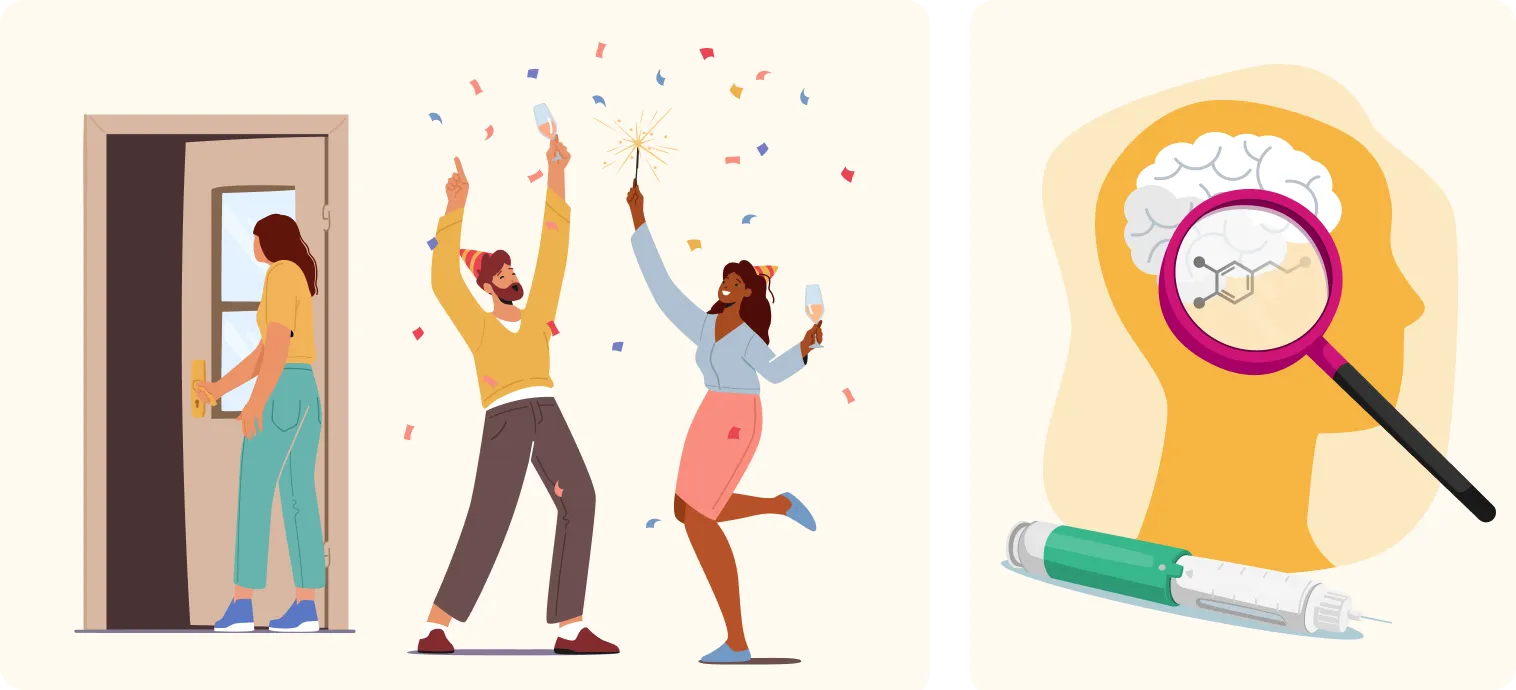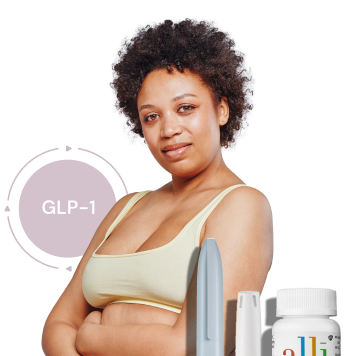While anhedonia from GLP-1 injections isn’t listed as a recognised side effect in most product leaflets, increasing patient reports and early research suggest these mood and reward shifts are worth understanding, especially if you’re not feeling like yourself on treatment.
Anhedonia—a reduced ability to feel pleasure—can manifest as emotional flatness for some people on GLP-1 medications. But others describe the exact opposite: a sense of freedom from habits they’ve struggled with for years, especially around alcohol, chocolate, and emotional eating.
It’s a paradox that speaks to how treatments like semaglutide (Wegovy) and tirzepatide (Mounjaro) affect more than just appetite. They also act on brain regions linked to motivation, reward and pleasure—including dopamine pathways.
As Zeinab, PillSorted’s founder, notes:
“I’ve spoken to so many people who say they love Mounjaro because it’s helped them finally kick habits they’ve battled for years. At the same time, some describe feeling emotionally flat. We know GLP-1s affect parts of the brain involved in reward. That might explain both experiences.”

What Is Anhedonia?
Anhedonia is defined as a reduced interest or pleasure in activities that were once enjoyable. It’s one of the core symptoms of depression but can appear on its own, especially in response to changes in brain chemistry.
This is particularly relevant to GLP-1 medications, which not only regulate appetite but also act on areas of the brain involved in reward and motivation.
Common symptoms
- Loss of interest in hobbies or social activities
- Reduced enjoyment from food, music, or entertainment
- Feeling emotionally “flat” or disconnected
- Lack of motivation to engage in usual routines
- Difficulty feeling excitement, joy, or pleasure
- Withdrawing from friends or loved ones
How common is anhedonia from GLP-1 injections?
Formal research on GLP-1-related anhedonia is limited, but patient forums and support groups suggest it affects a small subset of users. The experience appears more common in people with:
- Sensitivity to changes in brain chemistry
- Personal or family history of mood disorders
- Previous struggles with depression or anxiety
GLP-1 medications are being studied for their impact on reward-related disorders—not just obesity but addiction and emotional eating too.
Why might GLP-1s cause (or releive) anhedonia?
Appetite suppression and dopamine
GLP-1s are known to reduce appetite by acting on areas of the brain that regulate hunger and satiety. Some of these same areas overlap with dopaminergic reward pathways, the brain’s “pleasure circuits.” In some individuals, this could dampen the usual reward response not just to food, but to other activities as well.
Rapid lifestyle shifts
Losing weight, eating less, changing social routines alter how you interact with the world. If food was previously a major source of joy or comfort, removing that without replacing it with new forms of pleasure or connection can lead to low mood.
Underlying mental health
People with a history of depression, anxiety, or ADHD may be more sensitive to shifts in brain chemistry or emotional regulation. What seems like a medication side effect may also reflect underlying vulnerabilities.
The Reward System Connection
Recent research reveals that GLP-1 medications not only affect appetite but also influence the brain’s reward pathways. These medications act on areas involved in dopamine signalling, which affects motivation, pleasure, and habit formation.
Why Some People Experience Emotionally Flat
- Overlapping brain circuits: GLP-1 receptors influence both satiety and pleasure. Appetite suppression may unintentionally reduce other feel-good responses.
- Dopamine modulation: Altered dopamine activity can reduce the usual emotional “highs” from activities like socialising, hobbies or food.
- Lifestyle changes: Social meals, comfort eating or celebratory habits may shift quickly, leaving a pleasure void that takes time to replace.
Why Others Feel Liberated from Compulsive Behaviours
Interestingly, many people report that GLP-1 medications help them:
- Reduce alcohol consumption without conscious effort
- Break free from chocolate or sweet cravings they’ve battled for years
- Stop emotional eating patterns
- Feel “clearer” and less driven by food thoughts and cravings
This may be because GLP-1 medications dampen the rewarding effects of certain substances and behaviours, making it easier to disengage from previously compulsive patterns.
Managing anhedonia from GLP-1 treatment
Acknowledge the change
Don’t dismiss the feeling if you’ve lost interest in things you used to enjoy. Track your mood over a few weeks to identify whether it’s improving, stabilising, or worsening.
Stay socially engaged
Even if it feels like effort, regular contact with others helps guard against deeper mood dips.
Schedule joy
Reintroduce pleasure with small steps—walks, music, comedy, or creative outlets. Pleasure often follows repetition, not the other way around.
Support your mental health
Sleep, nutrition, and light movement (like stretching or yoga) can all support emotional wellbeing. Mindfulness and CBT-style practices may also help reframe low-motivation days.
Talk to a professional
If emotional numbness lasts beyond a few weeks or affects your relationships, work or quality of life, speak with your GP or mental health provider. They may recommend slower dose escalation, supportive therapy, or mental health review..
When to seek medical advice
Get professional support if you:
- Feel persistently emotionally numb or disconnected
- Experience thoughts of hopelessness, self-harm, or suicide
- Struggle to function at work, school, or in relationships
- Have a history of depression that seems to be worsening
- Notice other symptoms like insomnia, changes in appetite, or severe fatigue
Your provider may suggest adjusting the dose, slowing titration, or exploring supportive therapy.
Summary
GLP-1 medications can profoundly affect how your brain processes reward and pleasure. For many, this leads to welcome freedom from problematic behaviours. For others, it may temporarily reduce enjoyment in life more broadly.
Understanding these potential effects can help you:
- Make informed decisions about treatment
- Recognise when to seek support
- Work with healthcare providers to optimise your experience
- Appreciate both the benefits and challenges of these powerful medications
Remember: your mental health is as important as your physical health. If GLP-1 treatment is helping you break free from harmful patterns whilst maintaining your overall wellbeing, that’s ideal. If you’re struggling with mood changes, there are strategies and support available to help you navigate this journey successfully.
FAQs
Is anhedonia a common side effect of GLP-1 medications?
No, it’s not officially listed. But many patients and providers have started discussing it as a possible off-label experience—particularly for those sensitive to dopamine-related shifts.
Can it go away on its own?
Often, yes—especially if it occurs during dose increases or in the first few months. The brain tends to adapt over time.
Should I stop my GLP-1 if I feel emotionally numb?
No. Always speak with a clinician first. Adjusting the dose or combining treatment with mental health support may be more effective than stopping entirely.
Could this be depression instead?
It’s possible. Anhedonia overlaps with depression, but isn’t always part of a full depressive episode. Your doctor can help assess the cause and recommend appropriate care.
Do lifestyle changes really help?
Yes. Getting sunlight, reconnecting socially, and creating daily “pleasure rituals” can all help retrain the brain’s reward system and support your emotional wellbeing.
Related
- Common GLP-1 Weight-loss Side Effects
- Bloating from GLP-1 Injections
- Constipation from GLP-1 Injections
- Dehydration from GLP-1 Injections
- Diarrhoea from GLP-1 Injections
- Dry Mouth from GLP-1 Injections
- Fatigue from GLP-1 Injections
- Injectable Weight Loss Treatments (GLP-1)
- Nausea & Vomiting from GLP-1 Injections
- Sulphur Burps from GLP-1 Injections (Mounjaro, Wegovy): How to Manage Them



























